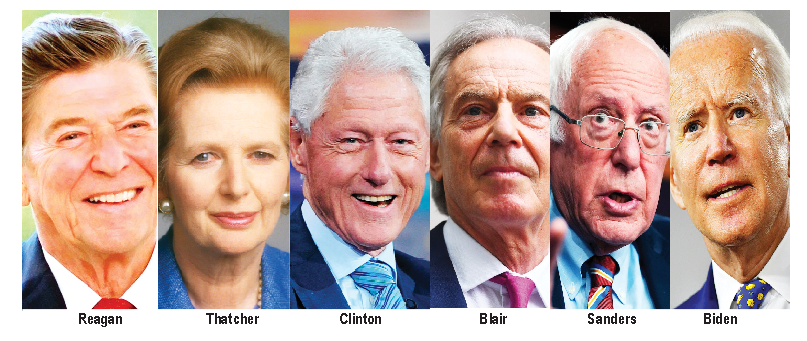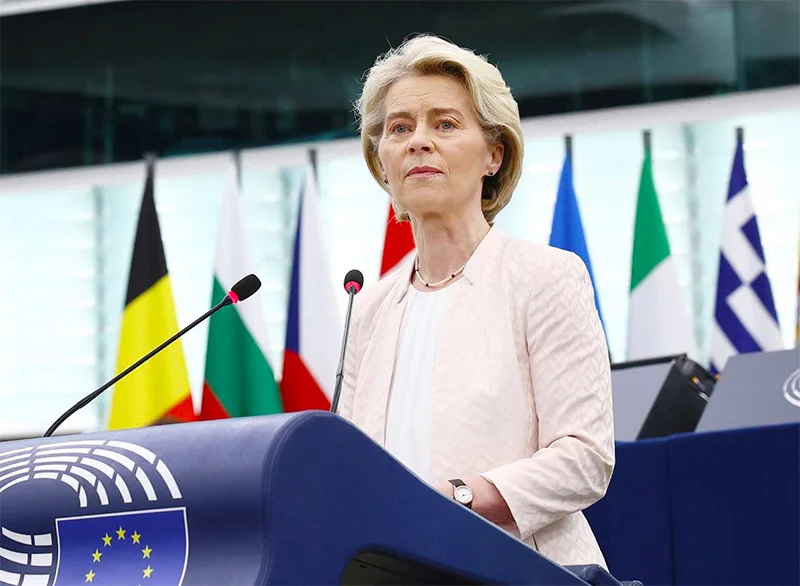Features
Is there a third way for social equity markets?

From a philosophical point of view, Islamic financial markets are actually risk-sharing stock markets with moral issues defined by the shariah. So far, few Muslim countries have used stock markets to make social change. A third way, therefore, is already technically feasible. All it takes is some courage to think and act ou-of-the-box.
By ANDREW SHENG
For too long, we have been told the choice is between the state versus the market. Former US President Ronald Reagan famously said, “Government is not the solution to our problem. Government is the problem”. Together with former UK Prime Minister Margaret Thatcher, he launched the global shift towards “Free Market Fundamentalism”. This was a right-wing reaction to the endless fiscal deficits and inflation generated by left-wing Keynesian economists’ preference for government intervention to solve market failures.
By the 1990s, former US President Bill Clinton and UK Premier Tony Blair pioneered the neoliberal middle way, adopting free market ideas of privatization, whilst preaching kinder, gentler social protection. Instead of solving government failure, they ended up with failure of both market and government with rising inequality, climate warming, populism and social polarisation. Neoliberal free market ideas in effect pushed bigger government captured by big business and huge vested interests. This sparked forces of polarization since the 1 percent benefited more than the 99 percent.
Guardian
columnist George Monbiot argued that the failure of neoliberalism ended with fascism that wants to go back to old times. US President Joe Biden’s framing of the fight between democracy versus autocracy sounds suspiciously like Big Business Democrats trying to look green and inclusive, versus MAGA (Make America Great Again) Republicans who seem like macho white supremacists to many non-Americans. Economics or politics is supposed to be about why, what and for whom? But behind that set of questions is Who acts to deliver What the people want?
Thus, the Trumpian call is for the private sector or Big Business to make change, whereas the Bernie Sanders solution is for more government to do the job. Is finance serving the real sector, or is it eating up the real economy? When government is too powerful and captured by the 1 percent, how different is that from an unelected bureaucracy ruling the 99 percent? Central banks just print money to enable the politicians to buy the votes. Once elected, everything is forgotten on promises till the next election.
Top-down political structures cannot work when the feedback from the bottom-up is missing. Worse, welfare programmes end up not reaching the poor and underprivileged, which is exactly what the inequitable vaccine distribution showed in the Covid pandemic. So, what is the alternative to Big Business or Big Government? Historically, we had the social institutions to deal with problems of excessive state or markets – the importance of mutual, cooperative and community charitable work.
When the social contract is broken, in the sense that the state is no longer functioning to deliver essential public goods and services or failing to protect the masses from raw capitalist greed, then communities organise to help themselves. Social enterprises are non-government or not-for-profit organisations that try to provide public goods not provided by the state or Big Business. Some of the best public goods, such as changes in global public health, education and the Green Revolution, were financed by charity organisations, like the Rockefeller Foundation.
Today, the Gates Foundation is a big funder of social change. Driven by the young, social enterprises are beginning to make waves in the areas of climate action, gender, poverty and social injustices. But their impact has been limited because they lack knowhow/talent, funding and trust/branding. Harvard business strategist Michael Porter was one of the first to ask why corporate philanthropy has not worked to fund more social enterprise work.
The answer is that CEOs were not focused or incentivised to push corporate social responsibility. Today, as investors expect CEOs to deliver on ESG (environmental, social and governance) goals, CEOs still face the problem of how to allocate corporate philanthropy resources. The hard reality is that the best talents for organization, knowhow and access to funding are with the for-profit corporations.
Their employees may be best positioned in their spare time to help micro-small medium-enterprises (MSMEs) become more effective in delivering social projects that enable real change at the frontiers of climate action or social justice. Social finance is defined as the network of processes, decisions and institutions that finance production of public goods with participation of the private sector. But that network does not exist because MSMEs often are too small and weak to access the talent, funding and branding/trust that donors (state, business or large charities) demand.
But the technological platform for raising public funding already exists in the form of stock markets, which have the approval, listing, trading information, registration, clearing, settlement and payment mechanisms. They simply do not operate for non-profit social enterprises. Similarly, private equity/venture (PE/VC) capital firms already have the technology, knowhow and funding to “coach” good companies towards listing or raising capital for profit.
So why can’t there be PE/VC firms that use their portfolio of MSMEs to decide which have for profit potential, and which can be groomed best in the not-for-profit social objectives? In short, markets like Hong Kong, Singapore and Kuala Lumpur have the opportunity to create Social Equity Markets.
From a philosophical point of view, Islamic financial markets are actually risk-sharing stock markets with moral issues defined by the shariah. So far, few Muslim countries have used stock markets to make social change. A third way, therefore, is already technically feasible. All it takes is some courage to think and act out-of-the-box.
(The Statesman/ANN)
Features
Acid test emerges for US-EU ties

 European Commission President Ursula von der Leyen addressing the World Economic Forum in Davos, Switzerland on Tuesday put forward the EU’s viewpoint on current questions in international politics with a clarity, coherence and eloquence that was noteworthy. Essentially, she aimed to leave no one in doubt that a ‘new form of European independence’ had emerged and that European solidarity was at a peak.
European Commission President Ursula von der Leyen addressing the World Economic Forum in Davos, Switzerland on Tuesday put forward the EU’s viewpoint on current questions in international politics with a clarity, coherence and eloquence that was noteworthy. Essentially, she aimed to leave no one in doubt that a ‘new form of European independence’ had emerged and that European solidarity was at a peak.
These comments emerge against the backdrop of speculation in some international quarters that the Post-World War Two global political and economic order is unraveling. For example, if there was a general tacit presumption that US- Western European ties in particular were more or less rock-solid, that proposition apparently could no longer be taken for granted.
For instance, while US President Donald Trump is on record that he would bring Greenland under US administrative control even by using force against any opposition, if necessary, the EU Commission President was forthright that the EU stood for Greenland’s continued sovereignty and independence.
In fact at the time of writing, small military contingents from France, Germany, Sweden, Norway and the Netherlands are reportedly already in Greenland’s capital of Nook for what are described as limited reconnaissance operations. Such moves acquire added importance in view of a further comment by von der Leyen to the effect that the EU would be acting ‘in full solidarity with Greenland and Denmark’; the latter being the current governing entity of Greenland.
It is also of note that the EU Commission President went on to say that the ‘EU has an unwavering commitment to UK’s independence.’ The immediate backdrop to this observation was a UK decision to hand over administrative control over the strategically important Indian Ocean island of Diego Garcia to Mauritius in the face of opposition by the Trump administration. That is, European unity in the face of present controversial moves by the US with regard to Greenland and other matters of contention is an unshakable ‘given’.
It is probably the fact that some prominent EU members, who also hold membership of NATO, are firmly behind the EU in its current stand-offs with the US that is prompting the view that the Post-World War Two order is beginning to unravel. This is, however, a matter for the future. It will be in the interests of the contending quarters concerned and probably the world to ensure that the present tensions do not degenerate into an armed confrontation which would have implications for world peace.
However, it is quite some time since the Post-World War Two order began to face challenges. Observers need to take their minds back to the Balkan crisis and the subsequent US invasions of Afghanistan and Iraq in the immediate Post-Cold War years, for example, to trace the basic historic contours of how the challenges emerged. In the above developments the seeds of global ‘disorder’ were sown.
Such ‘disorder’ was further aggravated by the Russian invasion of Ukraine four years ago. Now it may seem that the world is reaping the proverbial whirlwind. It is relevant to also note that the EU Commission President was on record as pledging to extend material and financial support to Ukraine in its travails.
Currently, the international law and order situation is such that sections of the world cannot be faulted for seeing the Post World War Two international order as relentlessly unraveling, as it were. It will be in the interests of all concerned for negotiated solutions to be found to these global tangles. In fact von der Leyen has committed the EU to finding diplomatic solutions to the issues at hand, including the US-inspired tariff-related squabbles.
Given the apparent helplessness of the UN system, a pre-World War Two situation seems to be unfolding, with those states wielding the most armed might trying to mould international power relations in their favour. In the lead-up to the Second World War, the Hitlerian regime in Germany invaded unopposed one Eastern European country after another as the League of Nations stood idly by. World War Two was the result of the Allied Powers finally jerking themselves out of their complacency and taking on Germany and its allies in a full-blown world war.
However, unlike in the late thirties of the last century, the seeming number one aggressor, which is the US this time around, is not going unchallenged. The EU which has within its fold the foremost of Western democracies has done well to indicate to the US that its power games in Europe are not going unmonitored and unchecked. If the US’ designs to take control of Greenland and Denmark, for instance, are not defeated the world could very well be having on its hands, sooner rather than later, a pre-World War Two type situation.
Ironically, it is the ‘World’s Mightiest Democracy’ which is today allowing itself to be seen as the prime aggressor in the present round of global tensions. In the current confrontations, democratic opinion the world over is obliged to back the EU, since it has emerged as the principal opponent of the US, which is allowing itself to be seen as a fascist power.
Hopefully sane counsel would prevail among the chief antagonists in the present standoff growing, once again, out of uncontainable territorial ambitions. The EU is obliged to lead from the front in resolving the current crisis by diplomatic means since a region-wide armed conflict, for instance, could lead to unbearable ill-consequences for the world.
It does not follow that the UN has no role to play currently. Given the existing power realities within the UN Security Council, the UN cannot be faulted for coming to be seen as helpless in the face of the present tensions. However, it will need to continue with and build on its worldwide development activities since the global South in particular needs them very badly.
The UN needs to strive in the latter directions more than ever before since multi-billionaires are now in the seats of power in the principle state of the global North, the US. As the charity Oxfam has pointed out, such financially all-powerful persons and allied institutions are multiplying virtually incalculably. It follows from these realities that the poor of the world would suffer continuous neglect. The UN would need to redouble its efforts to help these needy sections before widespread poverty leads to hemispheric discontent.
Features
Brighten up your skin …

 Hi! This week I’ve come up with tips to brighten up your skin.
Hi! This week I’ve come up with tips to brighten up your skin.
* Turmeric and Yoghurt Face Pack:
You will need 01 teaspoon of turmeric powder and 02 tablespoons of fresh yoghurt.
Mix the turmeric and yoghurt into a smooth paste and apply evenly on clean skin. Leave it for 15–20 minutes and then rinse with lukewarm water
Benefits:
Reduces pigmentation, brightens dull skin and fights acne-causing bacteria.
* Lemon and Honey Glow Pack:
Mix 01teaspoon lemon juice and 01 tablespoon honey and apply it gently to the face. Leave for 10–15 minutes and then wash off with cool water.
Benefits:
Lightens dark spots, improves skin tone and deeply moisturises. By the way, use only 01–02 times a week and avoid sun exposure after use.
* Aloe Vera Gel Treatment:
All you need is fresh aloe vera gel which you can extract from an aloe leaf. Apply a thin layer, before bedtime, leave it overnight, and then wash face in the morning.
Benefits:
Repairs damaged skin, lightens pigmentation and adds natural glow.
* Rice Flour and Milk Scrub:
You will need 01 tablespoon rice flour and 02 tablespoons fresh milk.
Mix the rice flour and milk into a thick paste and then massage gently in circular motions. Leave for 10 minutes and then rinse with water.
Benefits:
Removes dead skin cells, improves complexion, and smoothens skin.
* Tomato Pulp Mask:
Apply the tomato pulp directly, leave for 15 minutes, and then rinse with cool water
Benefits:
Controls excess oil, reduces tan, and brightens skin naturally.
Features
Shooting for the stars …

 That’s precisely what 25-year-old Hansana Balasuriya has in mind – shooting for the stars – when she was selected to represent Sri Lanka on the international stage at Miss Intercontinental 2025, in Sahl Hasheesh, Egypt.
That’s precisely what 25-year-old Hansana Balasuriya has in mind – shooting for the stars – when she was selected to represent Sri Lanka on the international stage at Miss Intercontinental 2025, in Sahl Hasheesh, Egypt.
The grand finale is next Thursday, 29th January, and Hansana is all geared up to make her presence felt in a big way.
Her journey is a testament to her fearless spirit and multifaceted talents … yes, her life is a whirlwind of passion, purpose, and pageantry.
Raised in a family of water babies (Director of The Deep End and Glory Swim Shop), Hansana’s love affair with swimming began in childhood and then she branched out to master the “art of 8 limbs” as a Muay Thai fighter, nailed Karate and Kickboxing (3-time black belt holder), and even threw herself into athletics (literally!), especially throwing events, and netball, as well.
A proud Bishop’s College alumna, Hansana’s leadership skills also shone bright as Senior Choir Leader.
She earned a BA (Hons) in Business Administration from Esoft Metropolitan University, and then the world became her playground.
Before long, modelling and pageantry also came into her scene.
She says she took to part-time modelling, as a hobby, and that led to pageants, grabbing 2nd Runner-up titles at Miss Nature Queen and Miss World Sri Lanka 2025.
When she’s not ruling the stage, or pool, Hansana’s belting tunes with Soul Sounds, Sri Lanka’s largest female ensemble.
What’s more, her artistry extends to drawing, and she loves hitting the open road for long drives, she says.
This water warrior is also on a mission – as Founder of Wave of Safety,
Hansana happens to be the youngest Executive Committee Member of the Sri Lanka Aquatic Sports Union (SLASU) and, as founder of Wave of Safety, she’s spreading water safety awareness and saving lives.
Today is Hansana’s ninth day in Egypt and the itinerary for today, says National Director for Sri Lanka, Brian Kerkoven, is ‘Jeep Safari and Sunset at the Desert.’
And … the all-important day at Miss Intercontinental 2025 is next Thursday, 29th January.
Well, good luck to Hansana.
-

 Editorial5 days ago
Editorial5 days agoIllusory rule of law
-

 News6 days ago
News6 days agoUNDP’s assessment confirms widespread economic fallout from Cyclone Ditwah
-

 Editorial6 days ago
Editorial6 days agoCrime and cops
-

 Features5 days ago
Features5 days agoDaydreams on a winter’s day
-

 Editorial7 days ago
Editorial7 days agoThe Chakka Clash
-

 Features5 days ago
Features5 days agoSurprise move of both the Minister and myself from Agriculture to Education
-

 Features4 days ago
Features4 days agoExtended mind thesis:A Buddhist perspective
-

 Features5 days ago
Features5 days agoThe Story of Furniture in Sri Lanka













